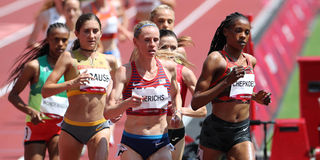Bahrain’s Yavi favourite, but Chemos confident of Kenyan win

Beatrice Chepkoech of Team Kenya (right) competes in the Women's 3000m Steeplechase heats on day nine of the Tokyo 2020 Olympic Games at Olympic Stadium on August 01, 2021 in Tokyo, Japan
What you need to know:
- This season, Yavi cruised to victory at the Turku (Finland) leg of the World Athletics Continental Tour, perhaps signaling her intentions at these Tokyo Olympic Games.
- Born in Kenya, Yavi opted to take up Bahraini citizenship in 2015 and was eligible to run under the red and white flag in 2016, winning the Asian Games steeplechase gold medal in Indonesia.
In Tokyo
Winfred Mutile Yavi finished fourth in the 3,000 metres steeplechase at the 2019 World Championships in Doha.
This was an improvement from an eighth-place finish at the 2017 championships in London.
This season, Yavi cruised to victory at the Turku (Finland) leg of the World Athletics Continental Tour, perhaps signaling her intentions at these Tokyo Olympic Games.
Born in Kenya, Yavi opted to take up Bahraini citizenship in 2015 and was eligible to run under the red and white flag in 2016, winning the Asian Games steeplechase gold medal in Indonesia.
With Kenya’s world record holder Beatrice Chepkoech battling hamstring and tendon injuries going into Wednesdays final, Yavi starts favourite.
But Milcah Chemos Cheywa, a former world steeplechase champion with a Commonwealth Games gold and two World Championships silver medals in her collection, sees an opportunity for Africa champion Hyvin Kiyeng bagging gold.
An African championships title and victory in 16 Diamond League rounds also add to Chemos’ stellar career.
With Kenya chasing the first Olympic gold in the women’s steeplechase, Chemos, also an athletes’ representative at Athletics Kenya, could hardly sleep Tuesday night.
She was crafting Yavi’s downfall and putting together pieces of advice for the athletes to employ.
Wednesday’s final will be run from 8pm Tokyo time (2pm Kenyan time) and the field has (in brackets: country, personal best time, world ranking): Valerie Constien (USA, 9:18.34, 34th), Peruth Chemutai (Uganda, 9:07.94, 10), Beatrice Chepkoech (Kenya, 8:44.32, 1st), Genevieve Lalonde (Canada, 9:22.64, 23rd), Courtney Frerichs (USA, 9:00.85, 7th), Zerfe Wondemagegn (Ethiopia, 9:16.95, 79th), Elizabeth Bird (Great Britain, 9:22.80 20th), Abebe Mekides (Ethiopia, 9:02.52, 11th), Hyvin Kiyeng (Kenya, 9:00.01, 2nd), Gesa Felicitas Krause (Albania, 4th), Luiza Gega (Spain, 9:19.93, 13th), Marusa Mismas-Zrimsek 9:16.82), Winfred Yavi (Bahrain, 9:02.64, 5th), Genevieve Gregson (Australia, 9:14.28, 14th), Emma Coburn (USA, 9:02.35, 3rd) and Carolina Robles (Spain, 9:34.30, 40th).
“What I can tell them (Chepkoech, Kiyeng) is that in the first 1,000 metres, they should assess how the race is and immediately after that look for positions and by the fifth lap, they should be in good positions, especially because Hyvin is a good sprinter,” Chemos advised.
Chemos predicts that Uganda’s Peruth Chemutai - fifth at both the 2019 World Championships in Doha and 2018 Africa Championships in Asaba – will do the early pacemaking, attacking from the front to compensate for her lack of kick.
“The best thing for the Kenyan ladies will be a fast race.
“Yavi is strong and Emma Coburn is the same so our ladies should lead from the front and when they get to the water-jump, they should execute the jumps fluidly to save some precious seconds,” Chemos tips the Kenyan ladies.
Previous winners of the women’s steeplechase at the Olympics since the race’s adoption into the Olympic programme in 2008 (Beijing) are Gulnara Samitova-Galkina (Russia, 2008), Habiba Ghribi (Tunisia, 2012) and Ruth Jebet (Bahrain, 2016).





